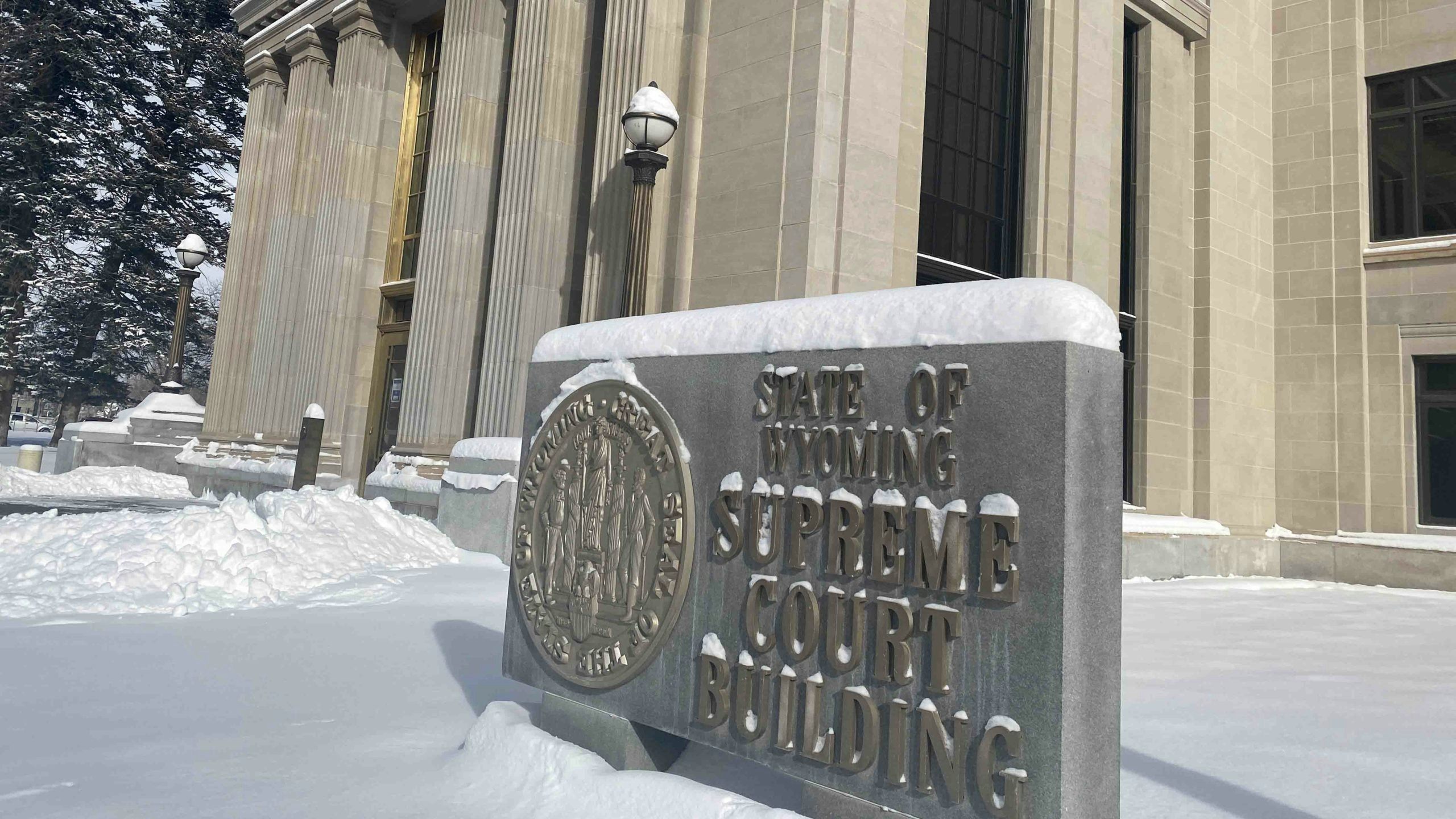The judge who held a public defense attorney in contempt after a scheduling hearing mix-up last October followed the rules for issuing penalties to lawyers, the Wyoming Attorney General argued.
Gillette-based public defender Christopher Goetz quit his job last autumn after District Court Judge Matthew F. G. Castano fined him $100 and ordered him to write an apology letter to a county prosecutor. Goetz was 45 minutes late to court following what he’s since characterized as a scheduling mix-up.
His departure from the job exacerbated a public defender shortage in the northeast corner of Wyoming.
Goetz challenged the penalty as unlawful in a December appeal to the Wyoming Supreme Court. The state’s high court on Friday set the matter for a “brief-only” argument, meaning that Goetz and the judge will not be arguing their opposing positions on the matter in person, just with court filings.
Wyoming Attorney General Bridget Hill filed a March 4 appeal on Castano’s behalf, which says the judge issued a civil sanction against Goetz, not a criminal contempt case.
Mobius Strip
Goetz argued in his brief that since Castano pronounced a criminal contempt conviction against him the day he was late to court – Oct. 10 – then Castano should have created a criminal contempt case and followed criminal proceeding rules.
Castano countered last week, via the AG’s filing, that he held Goetz, rather, in civil contempt and sanctioned him appropriately.
To decide which side is correct, the Wyoming Supreme Court may have to trace a mobius-strip style argument: in criminal cases, judges’ spoken orders take precedence over their written orders; whereas it’s the opposite in civil cases, in Wyoming.
Castano’s spoken order indicates the contempt charge was criminal, while his written order indicates it was civil, the case filings show.
It’s a case in which the order found to hold more weight with the court will also justify or condemn its own actions.
According to the AG’s filing, the judge’s written order sanctioning Goetz should hold more weight because it was filed as a civil proceeding, not a criminal one, and would therefore dictate the terms of the gesture.
“This Court does not need to address either of Goetz’s arguments,” wrote the AG, addressing the Wyoming Supreme Court. “Goetz’s arguments concerning a criminal contempt conviction and sentence are irrelevant because the district court never certified a criminal contempt conviction nor did it sentence Goetz for committing that offense.”
The Busy Day
Goetz was having a busy day juggling hearings in multiple courts on Oct. 10, says an appeal brief by his attorney Mike Bennett, sent in January to the state’s high court.
Goetz was representing a felony-level defendant named Jordan Borrego, who was scheduled for a 9:30 a.m. change of plea and bond hearing that day in Castano’s court.
The defender was also scheduled for a 9 a.m. preliminary hearing in Gillette Circuit Court, which handles misdemeanors. Though the preliminary hearing was set to end at 10 a.m., Goetz expected it to be a shorter process, a change-of-plea hearing, and he believed he could make it to both hearings, his brief indicates.
But the negotiations that would have led to a change of plea fell apart at the last minute – and the more time-consuming process of a preliminary hearing unfolded, Bennett wrote.
This Back And Forth
Meanwhile Judge Castano, a prosecutor from the Campbell County Attorney’s Office and the defendant, Borrego, were all waiting for Goetz in the district court.
Castano went into recess to try to find Goetz. He learned that Goetz was still in the preliminary hearing and that it wasn’t scheduled to end until 10 a.m., says his judgment order for Goetz’s contempt charge.
Goetz showed up in Castano’s court at 10:15 a.m.
“I apologize for being late, Your Honor,” said Goetz, according to a portion of the transcript included in his brief.
“You don’t apologize for being late,” Castano answered. “You knew this was set. You had a one-hour setting at 9 o’clock.”
In fact, the judge continued, the preliminary hearing even went past 10 a.m., which Castano knew from listening to it remotely, the brief relates from that discussion.
“You just displayed a cavalier attitude toward the Court, and you’ve done it before,” the judge added.
Why Not?
Goetz asked for the chance to explain his tardiness, and said he believed his 9 a.m. hearing would be much shorter because his negotiations in that case were geared toward a change-of-plea hearing. But those negotiations fell apart at the last minute, he said.
Instead of helping his client plead to a crime, he ended up cross-examining multiple witnesses on the stand, he indicated. After that, he had to argue about his client’s bond.
Castano noted that Goetz didn’t try to tell him about the change in plans.
“Your Honor… Once the proceedings began, I wasn’t going to pull my phone out to make any sort of indication when we’re in the middle of taking testimony from witnesses,” Goetz answered.
But Goetz could have asked the circuit court judge for a moment to step into the hallway, Castano countered.
“I could have, and I failed to do that,” Goetz answered.
“Why should this Court not hold you in contempt?” asked Castano.
“I would ask the Court not hold me in contempt, Your Honor,” said Goetz, adding that he’d given the best reason he could, and had expected to make it to Castano’s court on time.
He apologized again for being late.
Castano asked Goetz why he didn’t file a motion to reschedule Borrego’s hearing.
The answer, said Goetz, was because he wanted to resolve things for his client that day.
“Because I want Mr. Borrego to have his matter taken care of, for his bond issue to be lifted,” said Goetz.
Castano announced he’d hold Goetz in contempt of court and fine him $100. In a later judgement order Castano also ordered Goetz to write a letter of apology to the prosecutor.
“He did not ask anyone to inform the District Court of the situation… He knew he had overlapping hearings and (he didn’t) seek to continue either of them,” wrote Castano in a judgment order filed within Borrego’s case, against Goetz, later that day. “Mr. Goetz’s actions demonstrate a cavalier attitude toward this Court, the time and workload of opposing counsel and the time of his own client.”
Courtroom in the Campbell County Courthouse in Gillette, Wyoming. (Courtesy Photo)
The Issue That Isn’t The Issue
Goetz’s appeal brief isn’t about fixing the public defender shortage, though it references it.
In a January interview with Cowboy State Daily, he confirmed that he left the public defender’s office for another job after his contempt conviction, but he declined to say whether he left the job because of it. The incident “played a part” in the shortage, he conceded.
Nothing like this has happened to him before, Goetz told Cowboy State Daily.
He graduated law school at age 28, became a public defender in Wyoming right away and remained at that job for six years, he said.
Goetz’s brief references the difficulties of “an overburdened public defender office” striving to make hearings across multiple courts.
“Both recent and past events illustrate extraordinary staffing difficulties facing the Gillette Public Defender’s Office,” wrote Bennett in the brief.
Clair McFarland can be reached at clair@cowboystatedaily.com.





